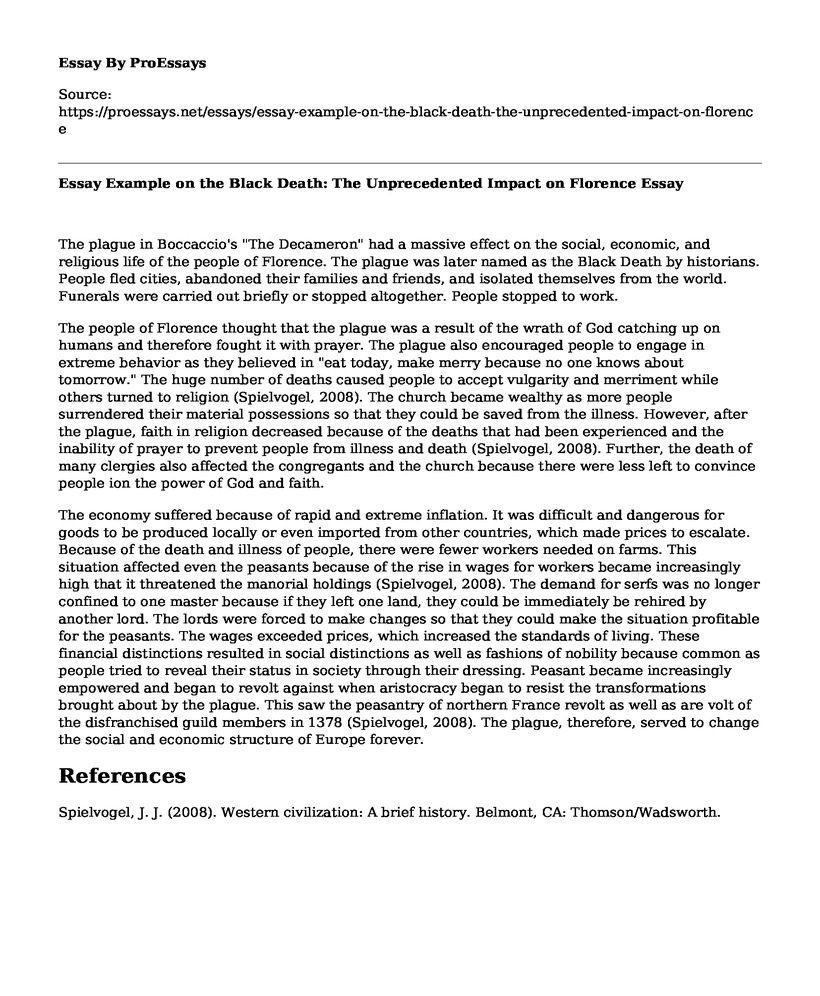The plague in Boccaccio's "The Decameron" had a massive effect on the social, economic, and religious life of the people of Florence. The plague was later named as the Black Death by historians. People fled cities, abandoned their families and friends, and isolated themselves from the world. Funerals were carried out briefly or stopped altogether. People stopped to work.
The people of Florence thought that the plague was a result of the wrath of God catching up on humans and therefore fought it with prayer. The plague also encouraged people to engage in extreme behavior as they believed in "eat today, make merry because no one knows about tomorrow." The huge number of deaths caused people to accept vulgarity and merriment while others turned to religion (Spielvogel, 2008). The church became wealthy as more people surrendered their material possessions so that they could be saved from the illness. However, after the plague, faith in religion decreased because of the deaths that had been experienced and the inability of prayer to prevent people from illness and death (Spielvogel, 2008). Further, the death of many clergies also affected the congregants and the church because there were less left to convince people ion the power of God and faith.
The economy suffered because of rapid and extreme inflation. It was difficult and dangerous for goods to be produced locally or even imported from other countries, which made prices to escalate. Because of the death and illness of people, there were fewer workers needed on farms. This situation affected even the peasants because of the rise in wages for workers became increasingly high that it threatened the manorial holdings (Spielvogel, 2008). The demand for serfs was no longer confined to one master because if they left one land, they could be immediately be rehired by another lord. The lords were forced to make changes so that they could make the situation profitable for the peasants. The wages exceeded prices, which increased the standards of living. These financial distinctions resulted in social distinctions as well as fashions of nobility because common as people tried to reveal their status in society through their dressing. Peasant became increasingly empowered and began to revolt against when aristocracy began to resist the transformations brought about by the plague. This saw the peasantry of northern France revolt as well as are volt of the disfranchised guild members in 1378 (Spielvogel, 2008). The plague, therefore, served to change the social and economic structure of Europe forever.
References
Spielvogel, J. J. (2008). Western civilization: A brief history. Belmont, CA: Thomson/Wadsworth.
Cite this page
Essay Example on the Black Death: The Unprecedented Impact on Florence. (2023, Jul 02). Retrieved from https://proessays.net/essays/essay-example-on-the-black-death-the-unprecedented-impact-on-florence
If you are the original author of this essay and no longer wish to have it published on the ProEssays website, please click below to request its removal:
- Jones Memorial Hospital Case Study
- Literary Analysis Essay on Monstro by Diaz
- Changing Community Understanding of Child Sexual Violence Paper Example
- Acquisition of Healthy Habits Paper Example
- Paper Example on Organization's Performance Metrics
- Essay Sample on Fortifying Alcoholic Drinks: Benefits & Disadvantages
- Paper Example on The Pfizer Works Program







